I wrote this chapter over the course of nine months. It was first drafted on gap year around the time we were headed to Jeju Island, South Korea, and finished on my couch in Aromas, California. Writing and revising this work feels like an act of time travel. It is not lost on me that amidst the drafts, the whole world order changed. With it, so too does my outlook on gap year and what it means in our lives. We left a world with a peculiar concept of “normal” only to enter a political regime that also challenges “normal”, sadly, for totally opposite reasons. This chapter of our trip, too, echoes across time for me, speaking to both dark recent histories and dark potential futures. Our particular experience involved many ups and downs, as adventures tend to imply. Yet, I find it especially enlightening for this present moment, as more and more of my life involves questioning the reasons for why things are the way they are.
Wednesday, June 26, 2024
We left Spain with bad omens. Talking to Lufthansa agents before we departed (when we could actually track them down), we knew there was bad weather in our Munich connection to Berlin. By the time we got on our flight from Bilbao, our connection was already canceled. We took the flight there anyway, as the airline staff recommended (in the same breath as a shrug).
We got to Munich late in the night, maybe around 10pm. As soon as we landed, we noticed that our phones didn’t connect to the local cell network like they have done in every other country. We would soon find out that Verizon Wireless was having a huge international network outage, but at the time, we didn’t know why our phones both malfunctioned. We would have to navigate Lufthansa's blunder totally analog. Ok, maybe there was wifi here and there, and we could make calls; it was annoying nevertheless.
We soon found ourselves in an enormous line consisting of 20 flights worth of displaced people, all missed connections due to weather. Is Munich the O’Hare of Europe? No announcements or people informed us of any options to get help, so we just waited an hour in a still standing line for basic answers. When and how could we get our bags? Would they reimburse us for a hotel and flight? How soon could we get to Berlin? Calling the support lines was futile, the phone queue was hopelessly long. So we waited.

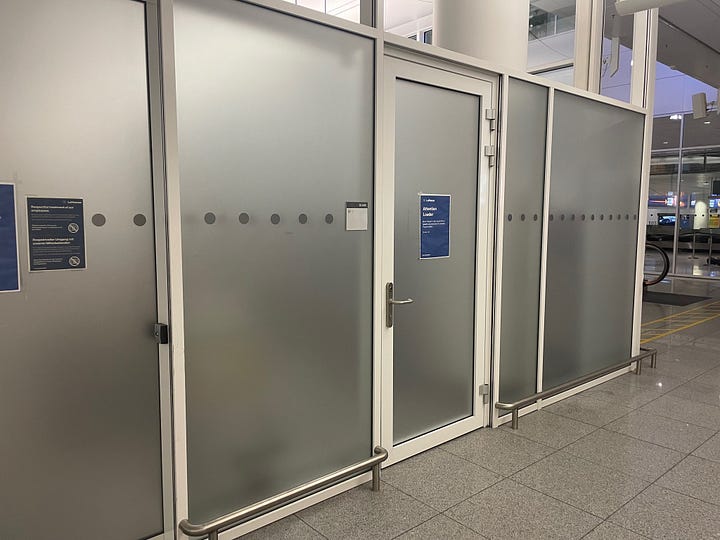
Finally, not too long before midnight, they announced that they were closing and we would have to leave the line. At this point, they disseminated some of the basic information that everyone was after — just book a hotel and they’ll reimburse us later. Being logistical geniuses, however, they also closed the baggage storage area at the same time, so we couldn’t get our bags or any of our clothes or medicine. Frustrated, we turned to our FindMy apps. We stood right in front of a translucent plastic barrier, staring at the AirTag maps on our phones, knowing that all our stuff was mere meters away. (I pleaded that they let us grab our bags as they were shutting down, but they refused).
We hopped in a taxi and headed for the hotel we booked by the train station. We drove over 200 kilometers per hour in a Mercedes Benz on a dark highway (we really were in Germany after all!). We bathed, washed our underwear, and slept hard.
Thursday, June 27, 2024
Since the weather was still projected to be bad today, we didn’t take the chance of spending more time in the airport limbo. We took the train from Munich to Berlin. We didn’t check after the fact, but we knew in our bones that Lufthansa would let us down again if we gave them another chance. We were especially disappointed that we didn’t have our bags with us, but we were promised their “immediate" delivery.
We scheduled the train for the afternoon, so we got to have a tranquil morning in Munich. Both Camille and I have spent a decent amount of time there before this visit; we love the city. We took advantage of being in Bavaria by enjoying lunch at a hofbrauhaus in the early afternoon.
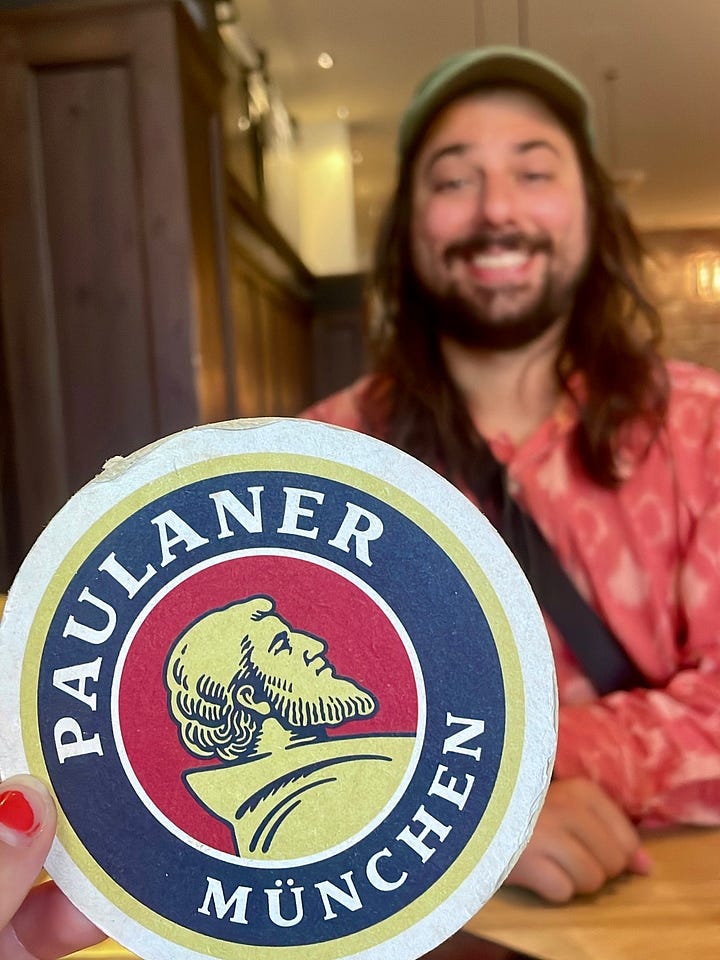

On the way to lunch, I called my travel insurance agent to ask what I could do to treat my foot, which was still in a lot of pain. The agent on the line, after I explained my months of pain and inability to walk, told me to go to the emergency room instead of health consultants. This counted as an emergency, in her view. So, I began Googling ERs in Berlin to visit as soon as we got there.
The train to Berlin was scenic and pleasant. The train had wifi, and I used what little connectivity I had to try to get medical bills so I could get them reimbursed. Camille used some of her internet access to discover that not just our phones were broken – the network outage was widespread for all of Verizon’s international plan users, maybe covering the whole continent. When we got to the Berlin Central Terminal, we took screenshots of the directions to our hotel, salvaging the last bit of certain wifi access.
We stayed at a really cool hotel right next to the East Side Gallery (i.e. the Berlin Wall). It was really cool and chic, but hard for us to appreciate. We got to the hotel with only our backpacks and the clothes on our backs, not knowing how long it would be till we got the rest of our belongings. Wrecked, we rested hard.
The only thing we did for the remainder of the day, given the hardest travel leg of our trip so far, was eat at a hotel-recommended döner kebab place nearby. I had to taxi both ways to get there, even though it was only 20 minutes away on foot, because of how painful walking was.
Friday, June 28, 2024
The morning was full of calls and plans to figure out how to get me healthcare. We went to the closest hospital to see how long it would take to get advice for my foot. It was just across the river to where we were staying – though, all distances were measured in Uber rider rides, given how I stood. We got into reception to learn that the wait would only be an hour. Inquiring a bit more, I learned this small clinic had no X-ray or MRI machines, which I needed. So, we bounced and took another taxi to a hospital farther away and headed straight for the ER.
Vivantes Am Urban hospital ranks three stars on Google, much lower than most hospitals in the area. We went to the ER and I stood around waiting to be seen. Camille sat in the waiting room area chairs while I stood in line – she must have drifted off to sleep a few times while we were there.
After making a cash deposit at the front of the clinic, I was sent to wait in the back room with other people who needed X-rays. I spoke to two people with broken limbs from bicycle accidents. Soon enough, I got scans of my foot.
The doctor took one good look at my X-ray and immediately noticed the stress in my sesamoid bones. There are two cute bones at the ball of my right foot that I had not been taking care of up to this point in my trip. He looked at my shoes – a pair of brown Blundstones that I had been obsessed with all of gap year thus far – and declared that these were my problem. Sleek as they may be, they provide no cushion on my feet, and directly transfer the force of the ground into my bones. This was conclusive enough for Camille and I that we did not feel the need to insist on an MRI today. We soon after left the ER and headed far into Berlin’s East Side to find a solution for my feet. We headed for the mall.
Exiting the taxi, we spotted many döner kebab restaurants, but opted to eat at the highest rated one on the block. It was just a stand on the side of the road, but the döner wrap was a force to be reckoned with. An older German woman inquired about what we were eating (in German). We expressed our delight via gestures and Google Translate. Just after we were finished with our lunch, she sat down at a table near us, döner in hand.
We went to a couple shoe stores, but were absolutely entranced by Globetrotter. Globetrotter is like if REI was also an exclusive airport lounge. Before we explored the store, we enjoyed an espresso at their in-store café. We found the cushiest pair of shoes they had available in gorp-green. I felt better on my feet almost as soon as I walked out of the store. Things were looking up.
We took a cab back home to our hotel, and decided to enjoy a cocktail in their lounge. It was a beautiful time of day. We had a good view of the river and the DJ was playing cool music on vinyl. And, as a further sign of our changing luck, we got our suitcases back this evening!
For the rest of the day, we did our first non-emergency outing: we walked (!!!) to the grocery store to stock up on supplies. We ate dinner on the way back.
Saturday, June 29, 2024
Despite being fully equipped with the medicine, clothes and tools to finally enjoy Berlin, we spent this day resting, spending nearly the whole day inside. We took advantage the last night’s grocery run in the morning and prepared a breakfast with the small stove in a chic kitchen that seemed like it wanted to offer the aesthetic, but not the reality, of utility – occupants of the room are to eat out, of course.
This meal broke our fast, but it did not stop us from sleeping for most of the day.
In the evening, we reflected on how we wanted to spend our time, and earnestly came to the conclusion that we wanted to go out. We were mostly unburdened by the feeling of having to “make the most” of our time in Berlin, which was fairly high on our list as a place to visit on gap year. Rest has to come from somewhere on our trip, and frankly, my foot and transit into Germany had kicked our ass, so we genuinely were ok to miss out on what the city had to offer. Sure, in another vision of our trip to Berlin, we’d go clubbing every night and even make it into Berghain. But, we knew the city wasn’t going away any time soon, and that if we wanted to come back, Berlin is only a plane ride away.
On this day there was a Euro Cup game and no one in town would miss it. Germany was playing, and they were going the distance that year. The football match was even taking place within Germany, so of course Germans wouldn’t miss it for the world. We decided to find a sportsbar to catch the game, hopefully over a stein and schnitzel.
We looked up a biergarten that we “simply had to go to” in the middle of town and headed there. I think we found out about it from a NYT travel list and figured it would be a really fun crowd to watch the game with. When we got out of the cab jumped right in line only to find that a lot of people had the same idea: this place was certainly an institution – and the game projected on a big screen, outdoor farm tables on green grass somehow conveniently located in the middle of town, classically good beer and food – and thus every table was taken. I found this out while walking past jersey-wearing Germans in local team colors to get to the bouncer, who implied that people had posted up all day just for this game, and that the best we could hope for was to hear the crowds cheer while we stood beyond the gate in line.
Since the game was going to start relatively soon, maybe in 30 minutes, Camille and I bounced. We saw that just across the street, there was a Korean restaurant with lots of outdoor tables, all empty. They were in the process of setting up a TV for folks to watch the game. Fans of Korean-style fried chicken and local German beers, we looked forward to their pairing and snagged a table. We drank some beer and waited a bit, nibbling on food as the restaurant staff set up a giant screen TV on a table just in front of us. Before we knew it, we had a front row seat for the football game, and all of the available tables behind us were taken by locals all trying to cheer on their home team.
The restaurant had a funny setup for the game. The smart TV had power supplied by extension cords feeding into the restaurant, but the internet was not connected by Ethernet nor Wifi. Instead, a member of the restaurant staff tethered their phone to the TV and streamed the game on YouTube. Suffice to say, there was more drama in our viewing than that caused by the game itself: in dramatic moments before goals, the network would cut out and the whole restaurant would wait in agony as we’d hear cheers or boos from up and down the street. Everyone in town was out of their house at some public place, beer in hand, cheering on the tributes for the fatherland.

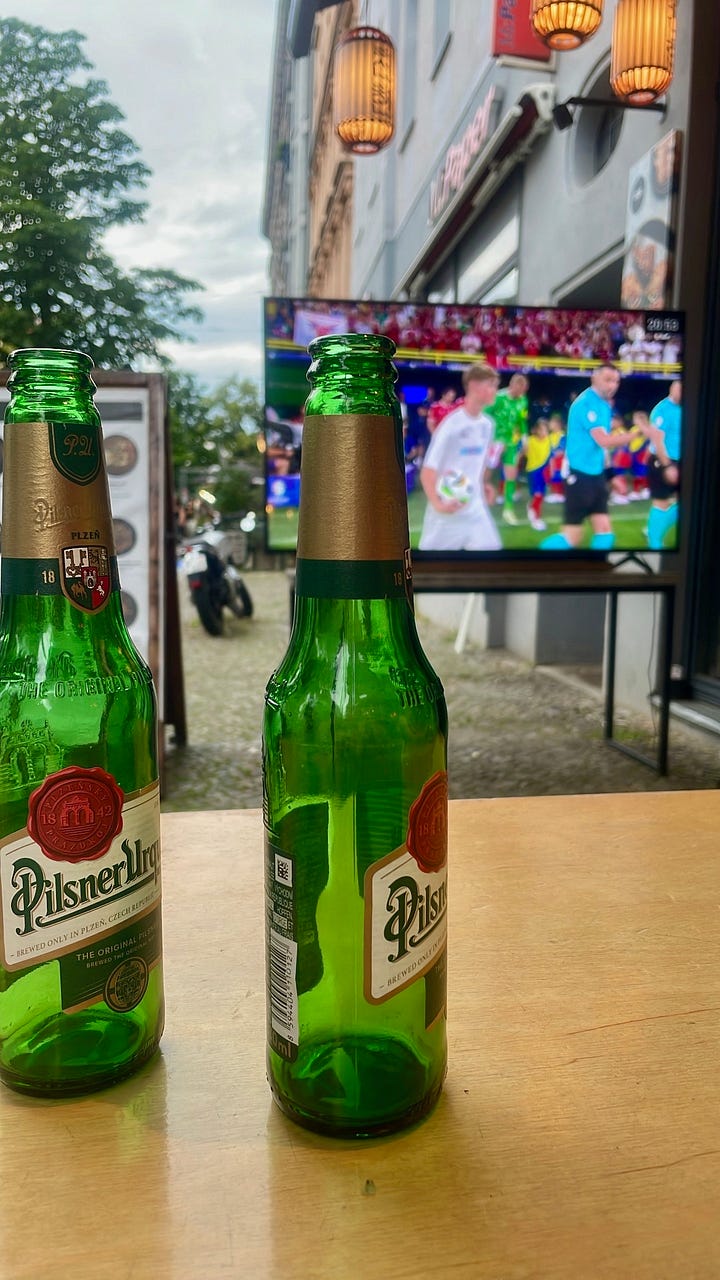
While it was a bright and sunny day where we sat, it was pouring cats and dogs at the stadium where the game took place. One of the internet freezes was on an incredible frame of a stream of water pouring down from the stands. We happened to have looked up details about the game and became enthralled with the Google Search Result Page (GSRP, or “gee-surp”, if you’re in the biz), which not only kept score, but included a “win probability”. During lags or long volleys between plays, we’d snicker at the changing probability bars, which added hyperreal drama to the already high stakes game against Denmark, who were really good this year. I noticed that folks sitting around us would accompany the bits of the game they could view with fraught checks of the score on Google, which especially amused me since the tech lead of the team I left used to work on building that probability bar (Hi, Fred!). I can’t believe the world of sports mimicked the NYT-style election needle, but here we all (stressfully) are.
Sunday, June 30, 2024
We compressed an entire tourist’s visit to Germany’s capital on this last full day in town. We began with a visit to the DDR museum, which focused on life inside communist Germany before reunification.
What can we say about the DDR museum? I was confused after walking into the entrance if we were in the right place. And, then, after wandering around interactive history lessons in German and English, I soon found myself in a virtual car “ride” – I was behind the wheel of a real Soviet era sedan whose windshield had been converted to a screen displaying the point of view of the driver. It felt like a low-poly, vaguely depressing Grand Theft Auto. I drove around enjoying the simulation as a toy rather than a (I assume, intended) experience of life at the time.
Camille and I both loved the demonstrations of home life in the GDR – we reveled in the kindergarten and simulation home kitchen, marveling at the Soviet bend towards the mid-century modern aesthetic that we still deeply admire.

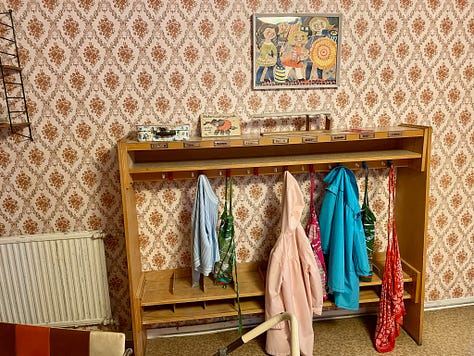

I vaguely remember having a conversation with Camille over another “immersive history experience” featuring a projected interactive screen that superimposed outfits on your image on the wall after you selected a garment from an adjacent closet. These always take me away from the period they seem to want to send me and instead have me focus on the kitschy gizmo-ishness of the creative direction. In my view, the physical period garments were where it was at, the camera-display apparatus, merely neat.
We left mid morning and braced ourselves for the main event: we headed for the Jewish Museum of Berlin.
Of the time that I spent writing this essay, describing this encounter is the thing I’ve most dreaded, or rather, I’ve had the greatest loss for words. Walking in the museum is inexplicable.
We entered underground in a long, white room with corridors extending upward and across from each other at odd angles. We listened to the audioguide, which explains the thesis of the design of the building. How does one craft architecture to commemorate the Holocaust? Daniel Libeskind, the Polish-American professor of architecture, accomplished this in ways where I couldn’t imagine a better alternative. It was profound as it was extremely Jewish. I cried nearly all of my time in this basement layer.
Walking upward the white, diagonal halls, with three cross sections, large swaths of the building incorporating “voids”, physical absences as an homage to the incalculable loss of the mass extinction, of the loss connection to the past and potential futures of a people, filled me with a vivid sorrow. I walked the corridors with tears, gazing upon artifacts and memorabilia of Jewish people’s normal lives before they were violently slain.
At the top of one of the corridors was one of the main voids, a perturbed angled room filled with darkness and brutal concrete chills. In the top right corner – a sliver of light was allowed in. We stood in the darkness taking it in, faces often affixed on to that tiny sliver of light.

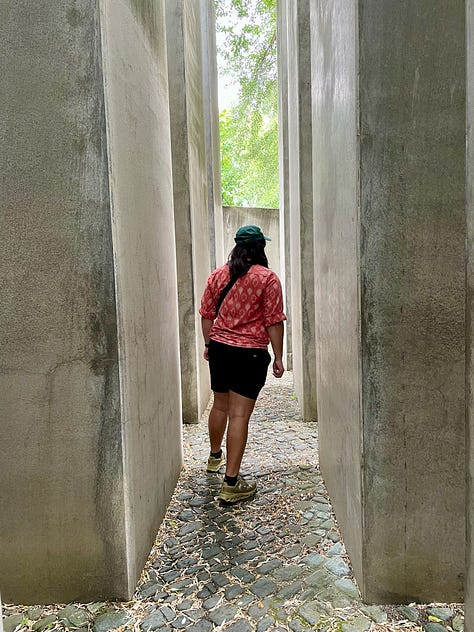

Beyond this void was a garden atop of a grid of concrete pillars. We again walked up from the entrance below a canopy far above us. The audioguide told us the dirt nurturing those trees were from the Holy Land. This comforted me.
We spent hours and hours in this museum. We walked on the famous Shalekhet, or Fallen Leaves, and listened to the metal rattlings as we stepped, like some somber autumnal nightmare.
In the upper levels of the museum, we learned everything from ancient to modern Jewish history. I enjoyed learning about Jewry through the ages. I was particularly struck by an exhibit focusing on the change of laws from the end of the Weimar Republic to the middle of Nazi rule. It displayed a timeline of the consistent, incremental steps towards criminalizing the life and existence of Jewish people. This exhibit stands out to me so much right now as an ominous warning as the laws and protections of basic rights of immigrants, people of color, and trans people are consistently, incrementally eroded. I publish this article on the cusp of Trump’s One Big Beautiful Bill, where he is reimagining ICE as resourced and expansive as a branch of the US military, where what was previously thought to be hyperbole now sounds like a resounding inevitability. Walking the halls of the Jewish Museum of Berlin, then, feels somewhat like traveling to the near future. I already see echoes of this all around me.
When we left the museum it was rainy. We had a lot to process. We went home, collected ourselves, and got dinner on the way to our next destination.
In the evening, we visited the Liquidrome, a German bathhouse that was highly recommended by someone we met in our travels. Much like a Korean spa, we spent the evening naked, switching between hot pools, cold plunges, and steam rooms. Unlike the Korean spa – or any bathhouse of our trip, the Liquidrome was all co-ed. This spa had a pool playing ambient music that was only audible if your ears were underwater. It was a decent setting to reflect on the day and to transition away from our time in the city.





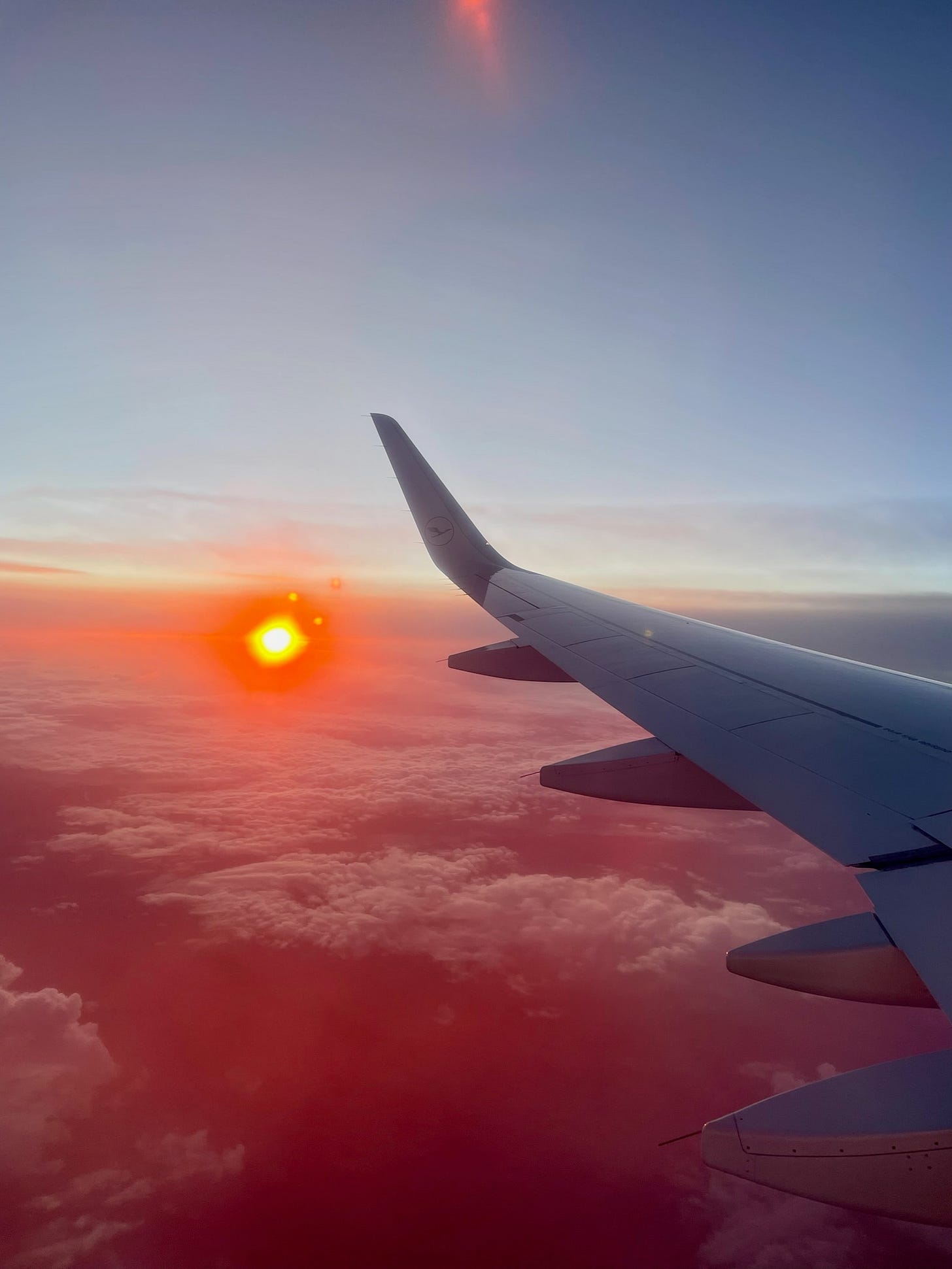
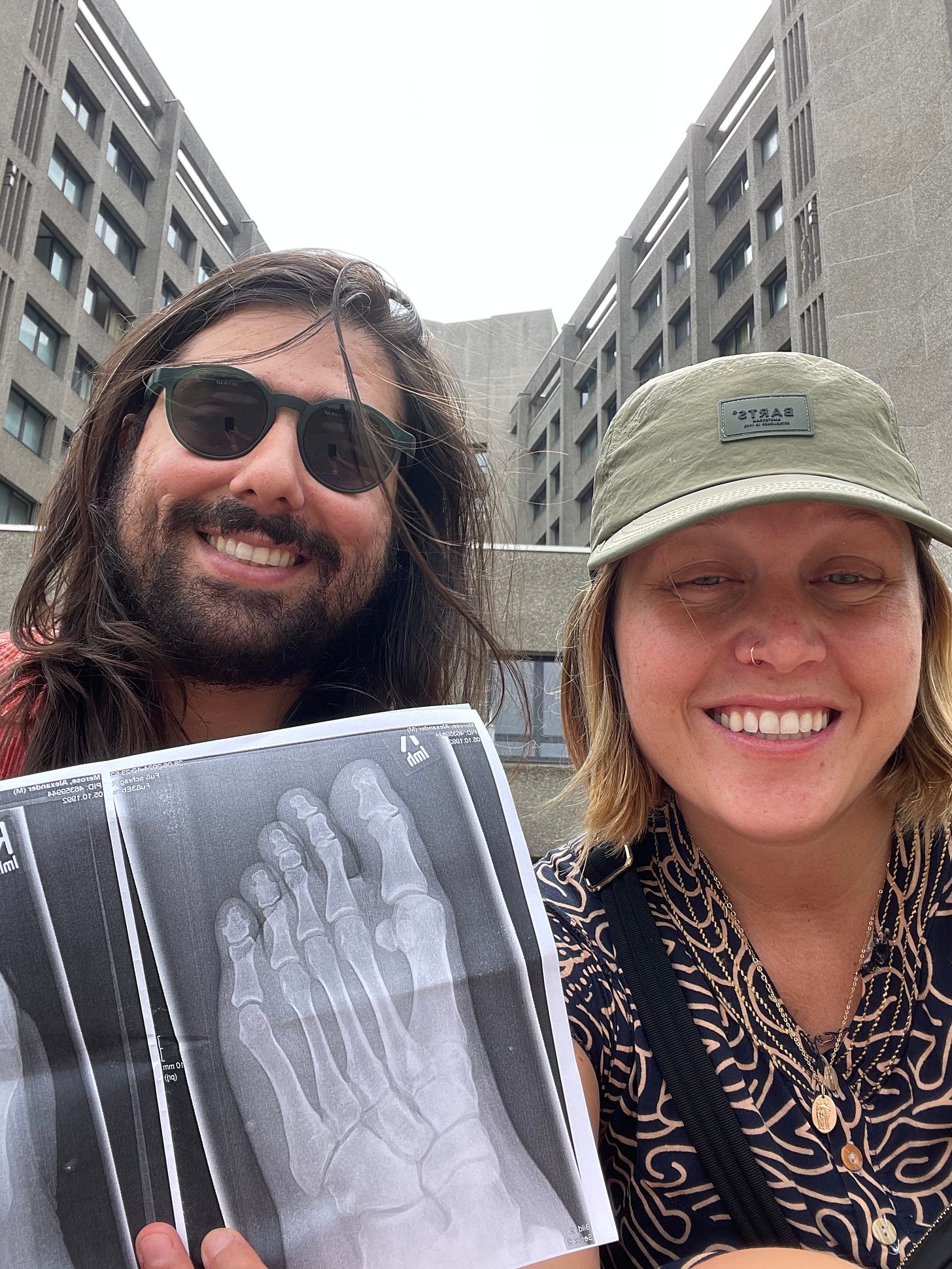
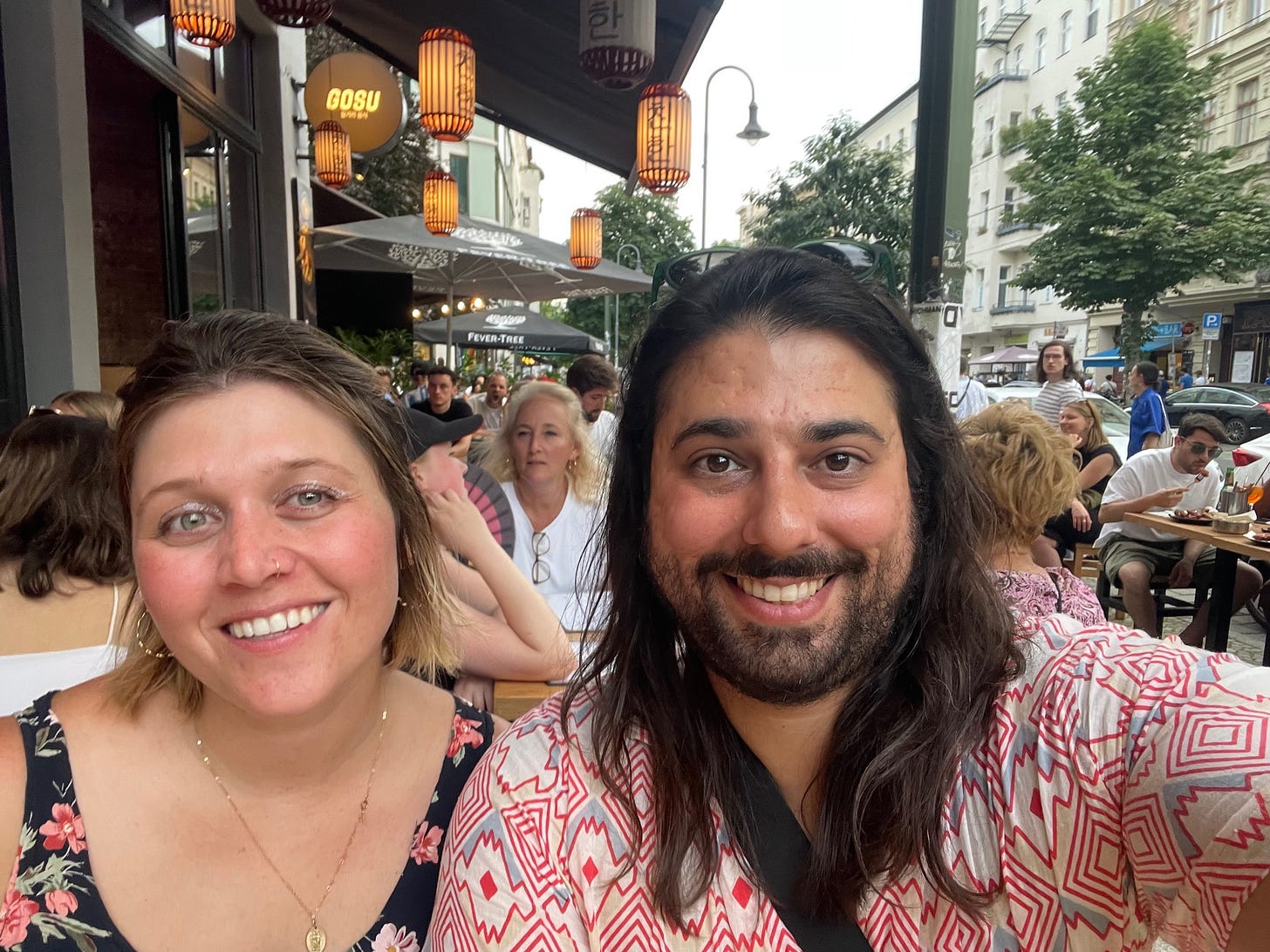

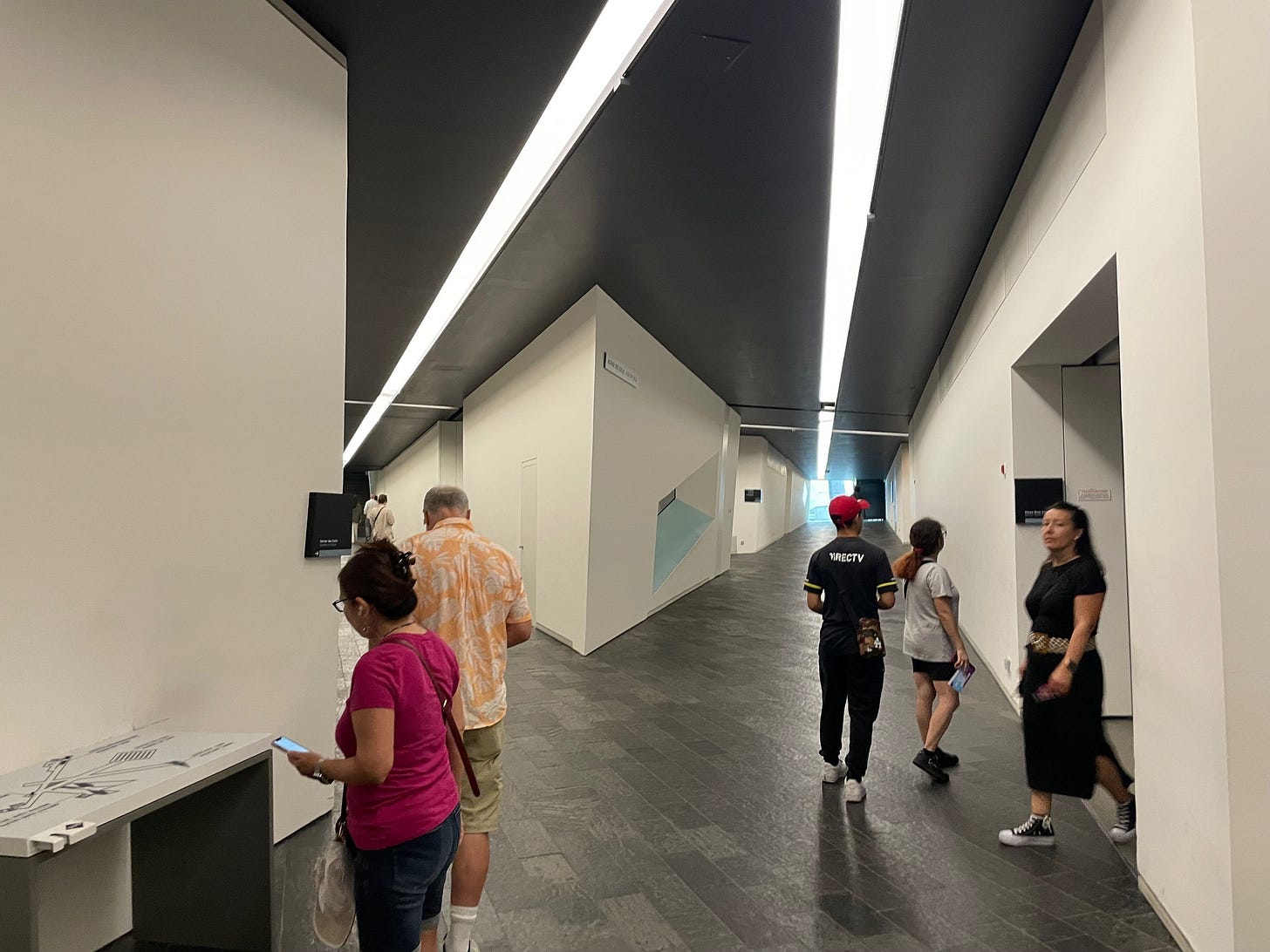
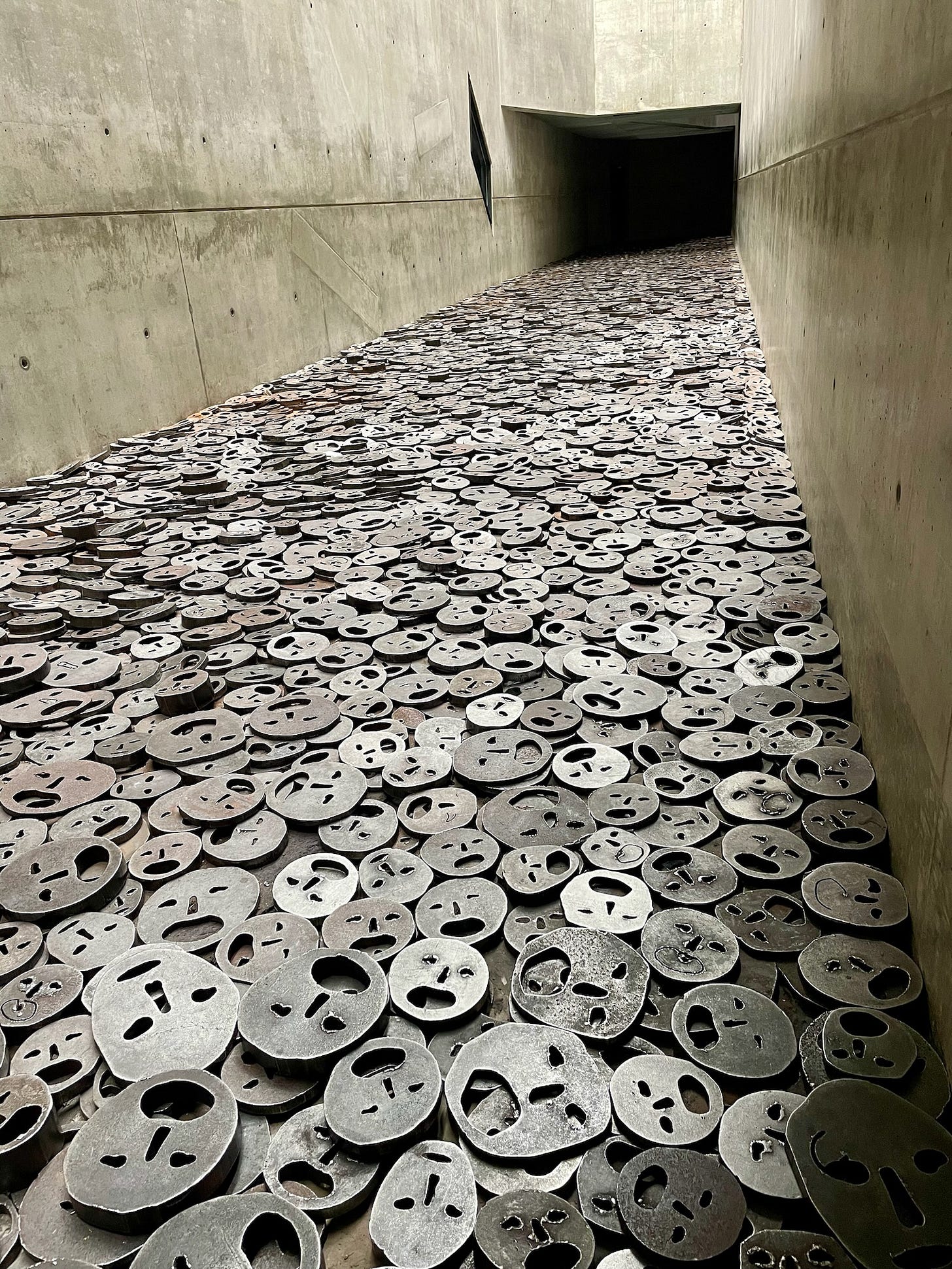

Powerful experiences Alex. And well written! Dad